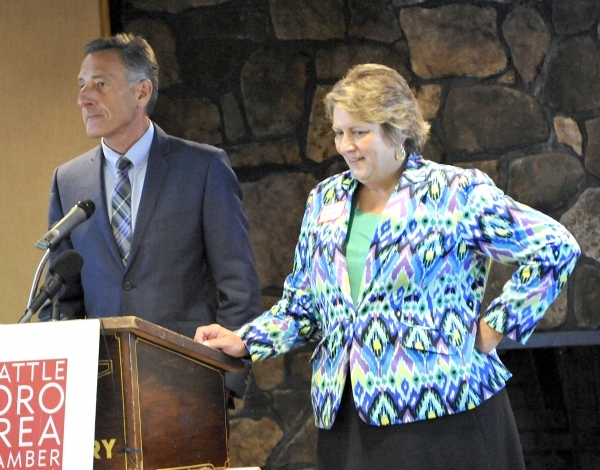BRATTLEBORO — As the state puts finishing touches on the Windham County Economic Development Program, state agencies held a public meeting to take feedback on a new revolving loan fund to help new and existing businesses in the county.
Feedback at the July 10 hearing held in the Selectboard Meeting Room of the Municipal Center ranged from inquiries for specific projects to making a case for seed funding to words of caution.
“We're going to have $3 million in applications and $2 million to give out,” cautioned Patricia Moulton, secretary of the Agency of Commerce and Community Development, predicting a heated first round of applications.
The WCEDP will receive $2 million annually for five years from Entergy as part of an agreement the company reached with the state regarding the closing of its Vermont Yankee nuclear plant in Vernon later this year.
Representatives of the Vermont Economic Progress Council (VEPC) and the Vermont Economic Development Authority (VEDA) also took questions from the public.
VEDA will manage the revolving loan fund on behalf of the state Agency of Commerce and Community Development.
Jo Bradley, chief executive officer of VEDA, said that while the details of the loan program are still in draft form, VEDA envisions the program as part of an overall funding package business owners can access.
The loan's interest rate will likely be 2 percent with a borrowing limit of $350,000 because that's the most VEDA can offer to loan in-house, she said.
She emphasised that VEDA is eager to build individual loan terms with applicants.
“There should be a little bit more of a risk tolerance to this particular loan program,” said Bradley.
VEDA has a loss rate of about 1 percent, she said.
Bradley responded enthusiastically when Tom Fegley of Omega Optical in Brattleboro asked if a business could apply for funding during various project stages.
Fegley said Omega was developing a product that may require funding for research through to building prototypes for field testing.
Spoon Agave proposed the state halt the WCEDP and instead sit on the $10 million. He said it seemed to him that the WCEDP is built on a foundation of old economic development theory that led to the likes of the Great Recession.
The economy of the future, he said, will look completely different. That future will be based on equity and human rights, he said. The state should craft a program that responds to that future.
Agave added that the state should move forward with the WCEDP only after Vermont “feels safe and secure” and consensus is reached from the community on how best to apply the funds.
Former Brattleboro Selectboard Chair Dick DeGray suggested the money go toward stipends for people moving to the area. The reason, he said, is that many businesses here say they have jobs but lack a sufficient workforce.
Glass artist and store owner Penelope Wurr, and Vernon resident Peggy Farabaugh, owner of Vermont Woods Studio, added their voices to those calling for micro-grants and seed money.
Farabaugh said she received a small grant through the Working Lands Enterprise Fund, which focuses on supporting agriculture and forrest related farms and businesses in the state. The grant made a huge difference in her ability to grow her business.
She added that she hoped as much of the money as possible would go to Vernon.
“We have to kind of recreate our community,” she said.
Farabaugh also asked if funds could help the town of Vernon build water and sewer lines to help attract businesses.
After the hearing, Grace Cottage Hospital CEO Roger Allbee said, “Sometimes it's not one thing that makes a company survive.”
Allbee, the former head of the Agency of Agriculture Food and Markets, and now a candidate for state senate, added that the agency, in developing the Working Lands program, found that although farmers and producers had access to loans, they lacked seed funding.
Meanwhile, ACCD said it is working to make the awards process and project outcomes as transparent as possible.
VEPC executive director Fred Kenney told the audience that applications and project descriptions will be posted to the Go Windham website. VEPC will also post project result and an overall annual report.
“We can adjust as out experience gets better,” said Moulton of the WCEDP. “Stay tuned. We'll have a better sense as time goes by.”
